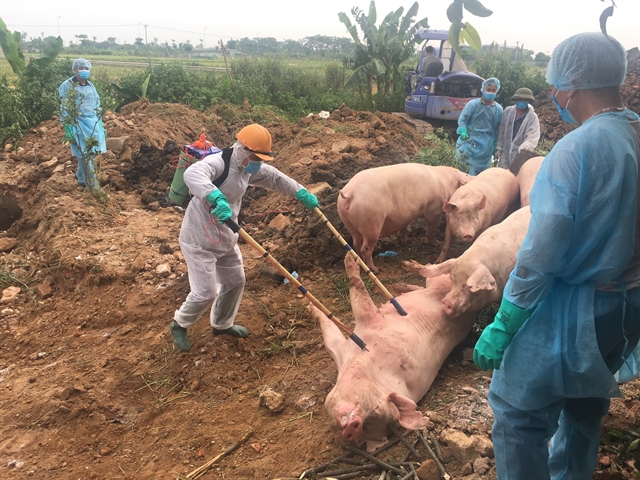 Society
Society


|
| Pigs infected with African swine fever are destroyed in Đông Anh District, Hà Nội.— VNA/VNS Photo Kim Anh |
HÀ NỘI — African swine fever continues to pose problems for the agricultural sector, with 522 small pig farms recently confirming cases of the disease in Hà Nội.
The report led to 4,631 pigs being destroyed within a week, said Nguyễn Ngọc Sơn, head of the city’s Livestock Production Division.
Districts of Ba Vì, Chương Mỹ, Phúc Thọ, Mỹ Đức and Ứng Hòa were among the areas most severely affected by African swine fever, Sơn said.
It is estimated about 518,000 pigs, equal to 27.6 per cent of the total pigs city-wide, have been destroyed due to African swine fever so far this year.
As many as 248 communes, accounting for 55 per cent of the city's total communes which suffered from the disease have gone 30 days without any new cases.
Nguyễn Huy Đăng, deputy director of the city’s Agriculture and Rural Development Department said the agency had taken drastic measures, following Directive No 34-CT/TW issued in May, to prevent and control the disease in the capital.
Additionally, the agricultural sector was co-operating with relevant agencies to strictly monitor the burial of pigs, instructing local breeders to take measures to stop the spread of the disease as well as disseminating information so that consumers do not stop buying pork, he said.
The sector was reviewing and supplementing materials and chemicals in aid of disease prevention in the city, he said.
It would continue maintaining animal quarantine stations at traffic hubs, he said.
In the southern province of Đồng Nai, the African swine fever virus has affected nearly 4,000 pig farms. More than 357,000 pigs have been destroyed so far.
In response, the Ministry of Agriculture and Rural Development instructed pig breeders to apply techniques to safely breed pigs as well as encouraged businesses to connect with breeders to set up safe livestock chains.
Nguyễn Xuân Dương, acting director of the ministry’s Livestock Production Department, said some important techniques in re-breeding included the applying of livestock biosecurity and the use of probiotics.
Pilot models used in several localities showed that the use of probiotics in animal feed could prevent the spread of African swine fever.
According to the ministry, African swine fever has caused a 7-per cent reduction (equal to over 4 million pigs) in the total number of pigs in the country so far this year.
Deputy Minister Phùng Đức Tiến said African swine fever is very dangerous. There is no approved vaccine against the African swine fever virus.
Therefore, we should not neglect prevention and control measures for the disease. They aimed to ensure the yield of pork to customers in the last months of this year, he said.
African swine fever is an animal disease that has spread rapidly across Asia over the past few months, according to the World Organisation for Animal Health. It is fatal for pigs and wild boars, and can be transmitted in a number of ways, including direct contact and contamination of food waste and feed.— VNS




